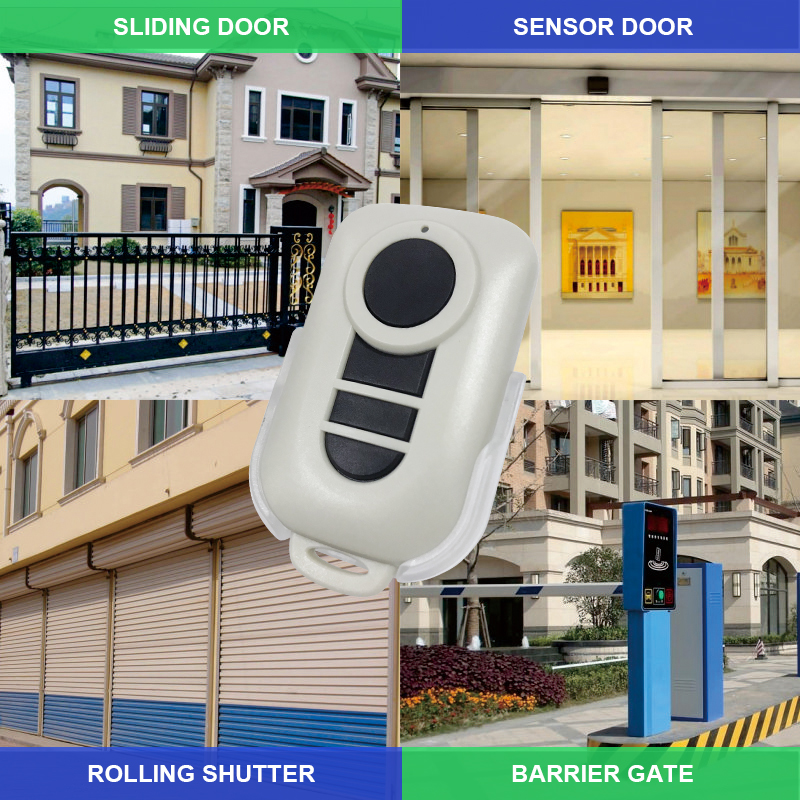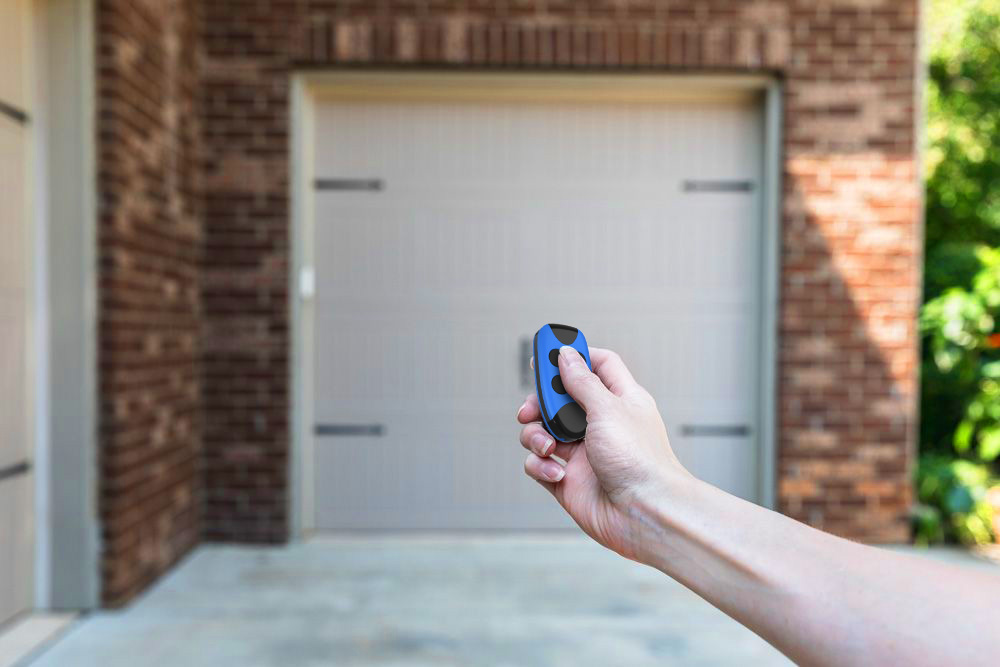Introduction
With the rapid development of smart home technology, more and more households are adopting smart devices to enhance their quality of life and convenience. As an important part of home security and convenience, the smart transformation of garage door remotes has also garnered widespread attention. This article will explore in detail whether garage door remotes can be compatible with popular smart home systems, analyzing the advantages and disadvantages of their compatibility and future development trends.
Basic Functions of Garage Door Remotes
A garage door remote is a device that uses radio signals to control the opening and closing of a garage door. Traditional garage door remotes primarily rely on fixed-frequency radio signals for operation, transmitting a signal to the garage door receiver through a simple button press, thereby achieving door opening or closing. With technological advancements, modern garage door remotes have gradually introduced more advanced encryption and frequency-hopping technologies to enhance security and reliability.
Basic Concept of Smart Home Systems
A smart home system connects various household devices and systems (such as lighting, heating, security systems, and appliances) through the internet, enabling centralized control and remote monitoring. Major smart home systems include Google Home, Amazon Alexa, Apple HomeKit, and Samsung SmartThings. These systems use smartphone apps or voice assistants, allowing users to control various devices in their homes with simple commands.
Compatibility Analysis Between Garage Door Remotes and Smart Home Systems
1. Necessity of Compatibility
Integrating garage door remotes into smart home systems can significantly enhance user convenience and security. For example, users can remotely control the garage door from anywhere through a mobile app or use a voice assistant to operate the garage door. Additionally, real-time monitoring of the garage door status and automation functions (such as automatically opening or closing the garage door based on the user's location) can increase the level of home intelligence.
2. Existing Compatibility Solutions
a. Wi-Fi Garage Door Controllers
There are many Wi-Fi-compatible garage door controllers on the market that can be integrated with smart home systems. These controllers typically connect to existing garage door openers to achieve smart control. For instance, MyQ by Chamberlain is a very popular Wi-Fi garage door controller that supports integration with Google Home, Amazon Alexa, and Apple HomeKit.
b. Zigbee and Z-Wave Modules
Some smart home systems, such as Samsung SmartThings, support Zigbee or Z-Wave protocols. By installing a Zigbee or Z-Wave module on the garage door opener, the garage door remote can be integrated into these smart home systems. These modules are usually compact and easy to install and configure.
c. Third-Party Integration Devices
Some third-party devices, such as smart relays or smart plugs, can help achieve compatibility between garage door remotes and smart home systems. For example, using a smart plug that supports smart home systems, you can indirectly control a traditional garage door remote.
3. Compatibility Challenges
a. Security Issues
One of the significant issues with smart home systems is security. As the garage door is a major entry point to the home, the security of its control signals is crucial. Traditional garage door remotes primarily rely on radio signal transmission, which is susceptible to signal interception and disruption. To ensure compatibility between garage door remotes and smart home systems, data transmission encryption and authentication mechanisms must be robust.
b. Compatibility Limitations
Differences in design and functionality among various brands and models of garage door remotes may limit their compatibility with certain smart home systems. Particularly, some older models of garage door remotes may not support modern smart home system connectivity methods.
c. Operational Complexity
Integrating garage door remotes into smart home systems may require certain technical knowledge and operational skills. This can be a significant challenge for non-technical users. Therefore, simplifying the configuration process and improving user experience is a problem that smart home system developers need to address.
Advantages and Disadvantages of Compatibility Between Garage Door Remotes and Smart Home Systems
1. Advantages
a. Enhanced Convenience
Controlling the garage door through a smart home system allows users to achieve remote and centralized control via a mobile app or voice assistant. For example, users can open the garage door in advance while on their way home or check whether the garage door is closed after leaving home. Additionally, the geofencing feature can automate garage door control.
b. Improved Security
Smart home systems typically integrate security alert functions. When the garage door is illegally opened or operated abnormally, the system can immediately send an alert to the user. Moreover, by real-time monitoring the garage door status, users can promptly identify and address potential security threats.
c. Increased Automation
Integrating the garage door remote into a smart home system can enable more automation scenarios. For example, in conjunction with smart lighting and thermostat systems, the garage lights can automatically turn on, and indoor temperature can be adjusted when the garage door opens. These intelligent features can enhance the overall smart level of the home and user experience.
2. Disadvantages
a. Increased Cost
Making a garage door remote compatible with a smart home system usually requires purchasing additional hardware devices, such as Wi-Fi controllers or Zigbee/Z-Wave modules, which increases the initial investment cost. Additionally, some advanced features of smart home systems may require subscription services.
b. Complex Configuration
Differences in compatibility between various brands and models of garage door remotes and smart home systems can complicate the configuration process, requiring certain technical knowledge and hands-on skills. For users unfamiliar with smart home technology, professional assistance may be necessary.
c. Network Dependence
Smart home systems typically rely on the internet for control and communication. If the network connection is unstable or interrupted, the remote control and monitoring functions of the garage door may be affected. Therefore, ensuring the stability and security of the home network is an important prerequisite for achieving intelligent garage door control.
Future Development Trends
1. Higher Integration and Compatibility
With the development of smart home technology, future garage door remotes will focus more on compatibility and integration with various smart home systems. Standardized communication protocols and open API interfaces will make it easier for different brands and models of devices to interconnect, enhancing user experience.
2. Enhanced Security and Privacy Protection
Future smart garage door remotes will emphasize the security of data transmission and user privacy protection. By adopting more advanced encryption technologies and authentication mechanisms, they will prevent signal interception and unauthorized access, ensuring home security.
3. Increased Automation and Intelligence
Future garage door remotes will feature more automation and intelligent functions. By deeply integrating with smart home systems, garage door remotes can automatically adjust opening and closing times and modes based on the user's daily habits and needs, enhancing the intelligence level of the home.
4. User-Friendly Design
Future garage door remotes and smart home systems will focus more on user-friendly design, simplifying the installation and configuration process, and improving user experience. Through smartphone apps and voice assistants, users will find it easier to control and manage home devices.
Conclusion
The compatibility between garage door remotes and smart home systems plays a significant role in enhancing home convenience and security. Despite current challenges in compatibility, security, and operational complexity, technological advancements and market demands will drive future smart garage door remotes to focus more on integration and compatibility with various smart home systems, offering safer, more convenient, and intelligent solutions.
By reasonably selecting and configuring smart garage door remotes, users can enjoy the convenience and security brought by smart homes, improving their quality of life. In the future, with the development of smart home technology, we can expect more innovative applications and more complete solutions, making our lives smarter and more efficient.

-
Office ViewQinuo Electronics Co., Ltd.was founded in 2009,it is a high-tech company that integrated R & D, manufacturing, sales and service for 15 years,which is mainly specialized in providing sensors of automatic door, control system of door and gate, car key remote, auto parts etc. The company currently has four independent brands: U-CONTROL, U-SENSORS, U-AUTOGATES and U-AUTOKEYS.
-
got questions? call us
+86 13960286508
-
fax :
+86 595 22901208 -
Email :
[email protected]
-
address
- No.991 Xingxiu Road,Taiwanese Investment Zone, Quanzhou, Fujian Province,P.R.China













